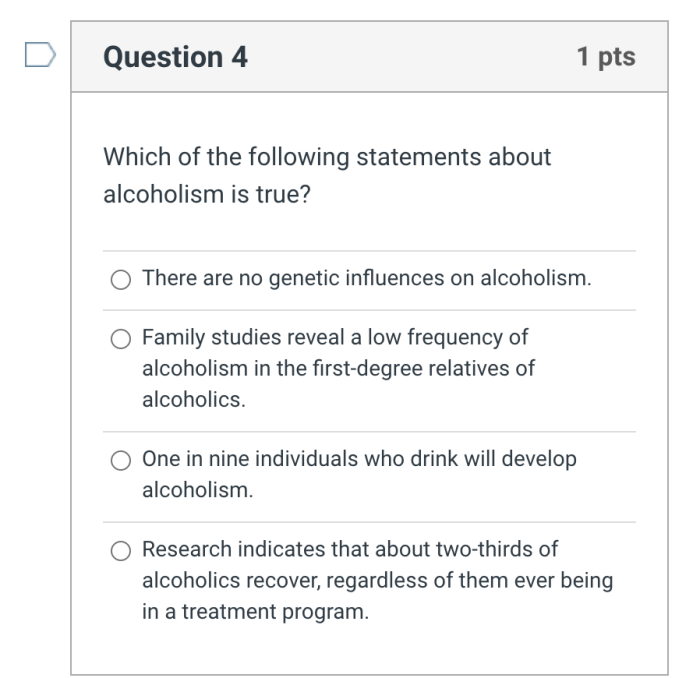Which of the following statements is true of alcoholism? Alcoholism, a chronic and progressive disease, profoundly impacts individuals, families, and society. Understanding the nature of this condition is crucial for effective prevention, intervention, and treatment. This article explores the key characteristics, risk factors, consequences, and treatment options associated with alcoholism, providing a comprehensive overview of this complex issue.
Alcoholism: Definition and Characteristics: Which Of The Following Statements Is True Of Alcoholism

Alcoholism, also known as alcohol use disorder (AUD), is a chronic, relapsing brain disease characterized by an impaired ability to control alcohol consumption, leading to significant impairment in health, social, occupational, or other important areas of functioning. The physiological effects of alcohol abuse include liver damage, heart disease, and neurological disorders.
Psychologically, alcohol abuse can lead to depression, anxiety, and cognitive impairment.
Impact of Alcoholism on Individuals
Alcoholism has severe consequences for individuals, including physical, mental, and emotional health problems. It can lead to organ damage, malnutrition, and an increased risk of accidents and injuries. Alcoholism also affects mental health, contributing to depression, anxiety, and cognitive impairment.
The social and economic impact of alcoholism on individuals is significant, leading to job loss, financial problems, and strained relationships.
Risk Factors for Alcoholism, Which of the following statements is true of alcoholism
The development of alcoholism is influenced by a complex interplay of genetic, environmental, and psychological factors. Genetic factors account for approximately half of the risk for developing alcoholism. Environmental factors, such as exposure to alcohol in early life or social influences, can also increase the risk.
Psychological factors, such as a history of trauma or mental illness, can also contribute to the development of alcoholism.
Treatment and Recovery
Treatment for alcoholism involves a combination of therapy, medication, and support groups. Therapy can help individuals understand the underlying causes of their alcoholism and develop coping mechanisms. Medication can help reduce cravings and withdrawal symptoms. Support groups provide a supportive environment for individuals to share their experiences and learn from others.
Recovery from alcoholism is a challenging process, but it is possible with the right treatment and support.
Social and Cultural Aspects of Alcoholism
Alcoholism is often stigmatized, leading to discrimination and social isolation for individuals who struggle with it. Cultural factors can influence the prevalence and perception of alcoholism, with some cultures having a higher tolerance for alcohol consumption than others. Understanding the social and cultural aspects of alcoholism is essential for reducing stigma and promoting effective treatment and recovery.
Essential Questionnaire
What is the definition of alcoholism?
Alcoholism is a chronic and progressive disease characterized by an inability to control alcohol consumption, despite negative consequences in various aspects of life.
What are the common risk factors for alcoholism?
Risk factors for alcoholism include genetic predisposition, family history, environmental influences, social stressors, and certain personality traits.
What are the physical consequences of alcoholism?
Alcoholism can lead to liver damage, heart disease, stroke, digestive problems, and various forms of cancer.
What are the psychological consequences of alcoholism?
Alcoholism can cause depression, anxiety, cognitive impairment, and psychosis.
What are the treatment options for alcoholism?
Treatment options for alcoholism include therapy, medication, support groups, and a combination of these approaches.

